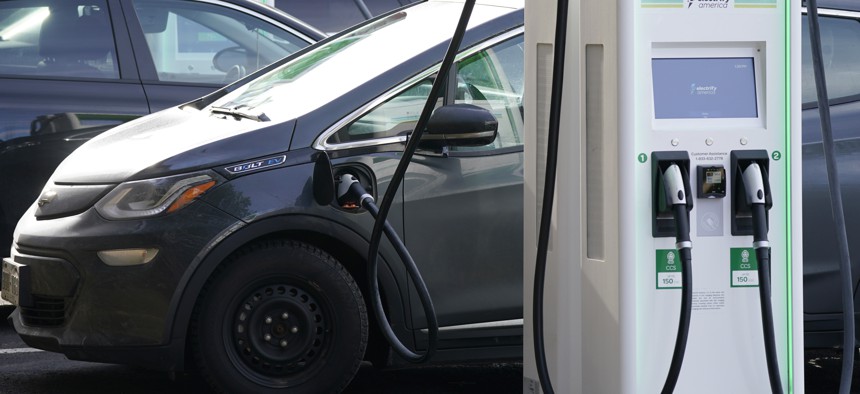5 Midwest States Form Electric Vehicle Pact

AP Photo/David Zalubowski, File
They plan to work together building out charging infrastructure and on other issues. The agreement comes after Ford unveiled plans for big electric vehicle investments in another region.
Governors from five Midwestern states, including four Democrats and one Republican, pledged this week to collaborate on developing an electric vehicle charging network across their region, and on other steps to support a shift towards electric-powered cars and trucks.
Illinois, Indiana, Michigan, Minnesota and Wisconsin are part of the pact. It is outlined in a voluntary memorandum of understanding that cites both environmental and economic reasons for embracing the technology. The governors are calling the initiative the Regional Electric Vehicle Midwest Coalition, or “REV Midwest.”
“Today’s REV Midwest partnership is a bipartisan effort to build the future of mobility and electrification and connect our communities,” Michigan Gov. Gretchen Whitmer, a Democrat, said. “Our partnership will enable the Midwest to lead on electric vehicle adoption, reduce carbon emissions, spur innovation, and create good-paying jobs.”
The announcement comes just days after Ford said it would invest billions of dollars into a pair of huge new facilities, one in Tennessee and one in Kentucky, to make electric vehicles. Ford, along with other automakers, is pressing ahead with a number of new electric models, including an all-electric version of its top-selling F-150 pickup truck.
Michigan is a long-standing hub for the U.S. auto industry and home to Ford's headquarters. Multiple news outlets reported this week that Whitmer said the state never had a "real opportunity" to compete for the new electric vehicle sites, while representatives for Ford pointed to other investments the company had made in Michigan.
Meanwhile, the infrastructure bill and a separate spending package that the Biden administration and Congressional Democrats are attempting to pass would give a boost to electric vehicles, with funding for charging infrastructure and rebates for purchases.
Democrats are generally more focused than Republicans on climate change and moving away from fossil fuels, towards cleaner sources of energy. The transportation sector is the nation’s biggest greenhouse gas emitter, making it an obvious target for achieving progress on this front. But, at the state level, there are signs that members of both parties increasingly see gains—both environmental and economic—to be had in the transition to electric vehicles.
Gov. Bill Lee of Tennessee, a Republican, and Andy Beshear of Kentucky, a Democrat, both celebrated the Ford facilities coming to their states as huge economic development wins.
Whitmer, in late September, said her state would pilot a one-mile stretch of roadway where electric vehicles could charge wirelessly. Indiana has a similar project in the works.
Indiana Gov. Eric Holcomb, a Republican, said he was “proud to partner” with his neighboring states, with Democratic governors, on the REV framework, adding that it would “put the Midwest region on the leading edge of providing the charging infrastructure needed to future proof our transportation network and meet the demand as rapid adoption of electric vehicles continues.”
The GOP chairman of the Transportation Committee in the Pennsylvania state Senate acknowledged this week that the technology could present opportunities for the state.
“I think we need to get ahead of this from a commonwealth perspective, and realizing the potential this has to bring jobs and economic growth to our region,” state Sen. Wayne Langerholc said during a hearing, according to StateImpact Pennsylvania.
Building a Foundation
Back in the Midwest, the five-state agreement aims to provide a “foundation for cooperation on fleet electrification along key commercial corridors to safeguard economic security, reduce harmful emissions, improve public health, and advance innovation.” And to “position the region to realize additional economic opportunity in clean energy manufacturing and deployment.”
It specifically notes opportunities to work on medium and heavy-duty fleet electrification, by coordinating on charging infrastructure, standardizing regulations and in other ways. This medium and heavy-duty category typically includes vehicles like buses and trucks and it isn’t as far along as the market for electric cars.
The governors are also seeking to “grow the region’s share of electric vehicle production” and to develop the workforce to support the industry. They also outlined a number of other objectives, including promoting equity, to help ensure that historically disadvantaged communities are not boxed out of the benefits that might arise as the electric vehicle sector expands.
Bill Lucia is a senior editor at Route Fifty and is based in Olympia, Washington.
NEXT STORY: Transit Agencies Lease Real Estate to Generate Much-Needed Cash






